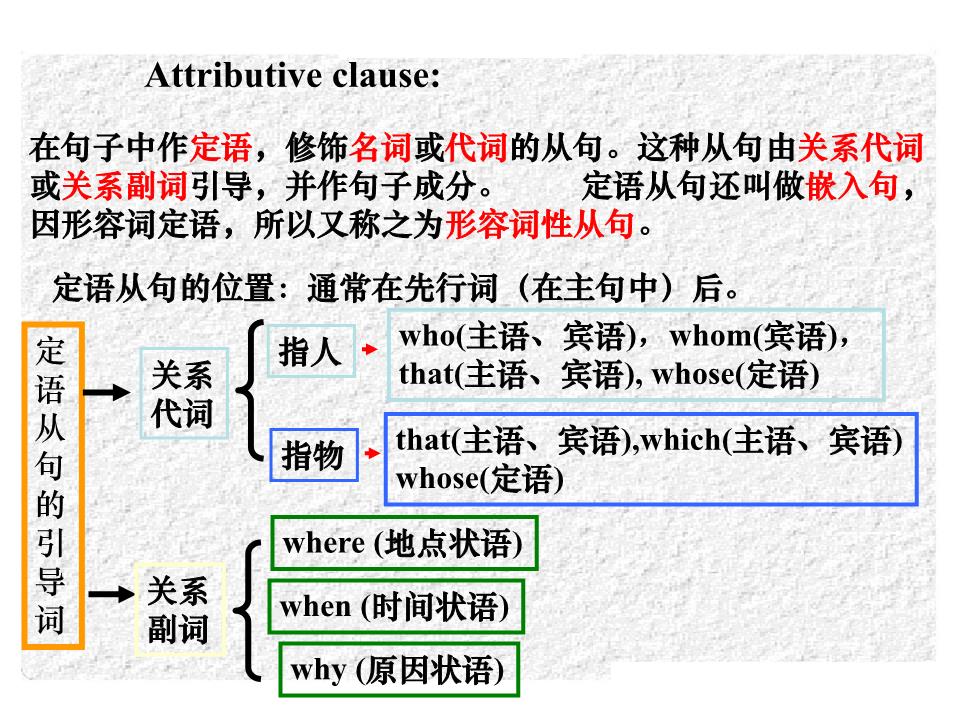限定性定语从句和非限定性定语从句的区别
的有关信息介绍如下:限制性定语从句与非限制性定语从句用法区别:
一、 句法功能、表现形式不同
定语从句分为限制性和非限制性两种。限制性定语从句不可缺少先行词,去掉它主句意思往往就不明确了,它与主句之间通常不用逗号分开;非限制性定语从句是对先行词的附加说明,去掉它也不会影响主句的意思。如:
Do you know the professor who is speaking at the meeting? (限制性定语从句)
English is an important subject, which every student should study well. (非限制性定语从句)
二、 先行词不尽相同
限制性定语从句的先行词往往是某一个词,但非限制性定语从句的先行词可以是一个词,也可以是句子的一部分,甚至是整个主句,此时非限制性定语从句一般由which或as引导,as引导非限制性定语从句常用在as is said / known / expected / mentioned / reported / announced等结构中。如:
He has passed the college entrance examination, which makes his parents quite happy.
As is known to everybody, the moon travels round the earth once every month.
三、 关系词的使用情况有所不同
1. that 不可引导非限制性定语从句。如:
Her father gave her a computer for her birthday,which pleased her a lot.
2. why 不用在非限制性定语从句中,需用for which代替。如:
I told them the reason, for which I didn't attend the party last week.
3. 关系代词替代情况不同
关系代词 whom 在限制性定语从句中作宾语时可用 who 代替 whom, 但 whom 在非限制性定语从句中作宾语时不可用 who代替。如:
This is the girl whom (who) I have been in love with for six years.
The young man had a new girl friend, whom he wanted to show all his love for.
4. 关系代词省略情况不同
关系代词在限制性定语从句中作宾语时可以省略;非限制性定语从句的所有关系代词均不可省略。如:
She is the new student (whom / who / that) I want to introduce to you.
All the books there, which have beautiful pictures in them, were written by him.
四、 下列情形用非限制性定语从句
1. 当“不定数量词 (如some, several) / 数词 + of which / whom”表示“整体 (which / whom)中的一部分”的概念时。如:
We saw many animals in the zoo, some of which are tigers.
There are fifteen new players in our team, two of whom come from Canada.
2. 当先行词为专有名词或被物主代词和指示代词修饰时,其后的定语从句通常是非限制性的。如:
My house, which I bought last year, has got a lovely garden.
Qingdao, where I have been three times, is an attractive city to foreigners.

扩展资料:
非限定性定语从句起补充说明作用,在句子中不充当成分,缺少也不会影响全句的理解,它与主句往往用逗号隔开。
定语从句有限制性和非限制性两种。限制性定语从句是先行词不可缺少的部分,去掉它主句意思往往不明确;非限制性定语从句是先行词的附加说明,去掉了也不会影响主句的意思,它与主句之间通常用逗号分开,将非限定性定语从句放在句子中间,其前后都需要用逗号隔开。
who引导
Our guide,who was a French Canadian,was an excellent cook.
我们的向导,一个法裔加拿大人,擅长于烹调。
My gardener,who is very pessimistic,says that there will be no apples this year.
我家的园丁非常悲观,他说今年将不结苹果。
whom引导
关系代词whom用于指人,在句中作动词宾语和介词宾语,作介词宾语时,介词可位于句首。
如:Peter, whom you met in London, is now back in Paris.
彼得现在回巴黎了,你在伦敦见过他。
Mr Smith,from whom I have learned a lot,is a famous scientist.
史密斯先生是一位著名的科学家,我从他那儿学了许多东西。
whose引导
whose是关系代词who的所有格形式,在从句中作定语。whose通常指人,也可指动物或无生命的事物。
如:The boy, whose father is an engineer, studies very hard.
那位父亲是位工程师小男孩学习很努力。
Above the trees are the mountains, whose magnificence the river faithfully reflects on the surface.
在树林的高处是山,其壮丽的景色完全映照在河面上。
The play,whose style is rigidly formal,is typical of the period.
这剧本是那个时期的典型作品,风格拘谨刻板。
which引导
关系代词which在非限制性定语从句,中所指代和修饰的可以是主句中的名词、形容词、短语、其他从句或整个主句,在从句中作主语、动词宾语、介词宾语或表语。
① which指代主句中的名词,被指代的名词包括表示物、婴儿或动物的名词、表示单数意义的集体名词以及表示职业、品格等的名词。
如:These apple trees,which I planted three years ago,have not borne any fruit.
这些苹果树是我三年前栽的,还没有结过果实。
She is an artist,which I am not.
她是一位艺术家,而我不是。
Water,which is a clear liquid,has many uses.
水是一种清澈的液体,有许多用途。
The two policemen were completely trusted,which in fact they were.
那两个警察完全受到信任,事实上也确实如此。
② which指代主句中的形容词。
如:She was very patient towards the children,which her husband seldom was.
她对孩子们很耐心,她丈夫却很少这样。
She is always careless,which we should not be.
她总是马虎大意,我们可不应该这样。
③ which指代主句中的某个从句。
如:He said that he had never seen her before,which was not true.
他说以前从没见过她,这不是真的。
④ which指代整个主句。
如:In the presence of so many people he was little tense, which was understandable.
在那么多人面前他有点紧张,这是可以理解的。
He may have acute appendicitis,in which case he will have to be operated on.
他可能得了急性盲肠炎,如果是这样,他就得动手术。
When deeply absorbed in work,which he often was,he would forget all about eating and sleeping.
他经常聚精会神地工作,这时他会废寝忘食。
when引导
关系副词when在非限制性定语从句中作时间状语,指代主句中表示时间的词语。
如:He will put off the picnic until May 1st, when he will be free.
他将把郊游推迟到5月1号,那时他将有空。
where引导
副词where在非限制性定语从句中作地点状语,指代主句中表示地点的词语。
如:They went to London,where they lived for six months.
他们去了伦敦,在那儿呆了六个月的时间。
参考资料:百度百科-非限定性定语从句



